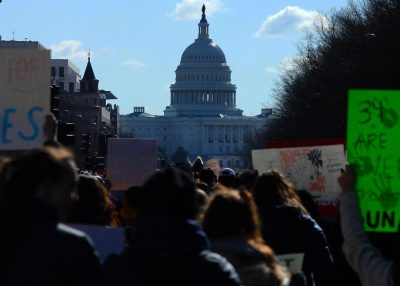
A group of Boston activists are traveling to Washington, D.C. to protest for the passage of national voting rights legislation. They’ll take part in Wednesday’s ‘Voting Rights Now!’ protest just outside The White House.
Organized by Black Voters Matter, a national organization working to increase voting power for predominantly Black communities, the protest will start at the newly renamed Black Lives Matter Plaza before heading towards Lafayette Square, right in front of the White House.
Aziza Robinson-Goodnight, project director of New Democracy Coalition’s Boston reparations project, plans to attend the protest and said the goal is to have legislation signed as soon as possible.
“It’s about the fact that African Americans are the pioneers of the Voting Rights Act,” Robinson-Goodnight said. “So it’s important for us that there not be any way of discriminating at the polls or discriminating any citizen from voting.”
Protestors hope to pressure President Joe Biden to show leadership and get the Freedom to Vote Act, John R. Lewis Voting Rights Advancement Act and the Washington, D.C. Admission Act passed through the Senate and delivered for his signature.
“We just haven’t seen enough investment and support in making sure that this is something that becomes a legacy for this White House instead of just another issue that is sitting on someone’s desk,” said Jacob Urena, Canon Missioner at The Order of St. Martin de Porres and a participant in Wednesday’s protest.
Key proposals within the Freedom To Vote Act include making Election Day a holiday and allowing for same-day voter registration.
“[Voting] is a right for every American citizen no matter what party, no matter what ideology and it should be easy,” Urena said. “Why is … voting a privilege for the few and not a right for the many?”
Both Urena and Robinson reiterated engagement when asked about the importance of passing both bills.
“We will be removing more and more barriers toward the civic process,” Urena said. “The more barriers we remove, the more we will see that there will be more engagement.”
Robinson-Goodnight argued that the policies would also make it easier for the youth — who are voting at lower rates — to vote.
“They don’t even know when the election is or about the election,” she said.
Activists who are not participating in the protest also support the passage of both bills.
“These bills are very important at the national level, and they would change a lot of things in Massachusetts,” said Alex Psilakis, Policy and Communications Manager at MassVOTE, a non-profit advocating for increased electoral participation.
MassVOTE has spent close to a decade lobbying for same-day voter registration in the state, Psilakis said.
“There’s also this fear among incumbents that if this reform passes, more people are going to vote and there’s a greater chance incumbents will lose,” Psilakis said, calling that opinion “absurd and disgusting.”
Robinson-Goodnight said she sees the issue as one of the few failures in Boston’s record in voting rights.
“We say we are an innovative city, but the way government actually moves or works is actually in the past,” she said.
Nationally, all three bills have been passed by the House of Representatives but face significant opposition in the Senate. Passage of a bill through the Senate requires either 60 votes or a simple majority of 50 votes with Vice-President Kamala Harris voting as a tie-breaker. The latter process requires the filibuster to be abolished — a move Democrats, who hold 50 seats and control the Senate, are considering.
Urena said he views voting rights as a non-partisan issue and would prefer the bill be passed in a bi-partisan fashion without killing the filibuster.
“That’s utopian in my understanding, and I acknowledge that,” Urena said.












































































































